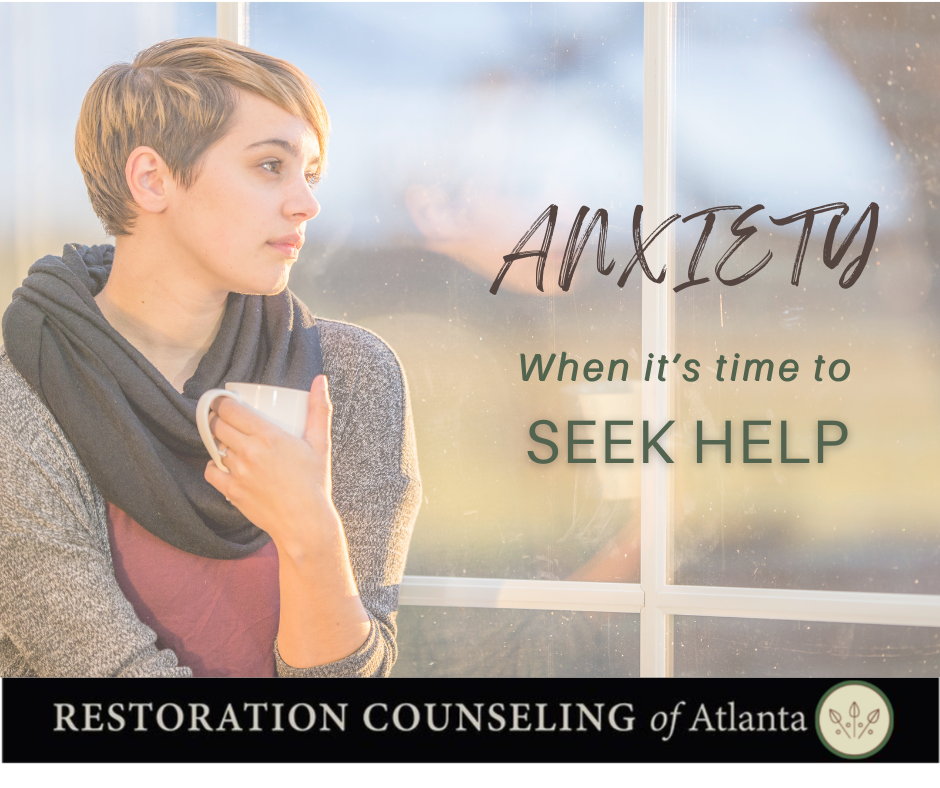When it’s time to seek help
“I feel anxious.” “I have anxiety.” “I’m so stressed!” Does anyone get a pass these days when it comes to anxiety and stress? These feelings are a normal part of life. Some stress and anxiety are useful in that they get your adrenaline pumping enough to spring you into action. But it seems as though many people are experiencing unhealthy levels of stress and anxiety these days. According to the National Institute of Mental Health, about 31.1% of adults in our country experience one of the anxiety disorders at some point in their lives.
Is what I’m feeling “normal?”
So how do you know when anxiety goes from a normal part of living to a problem that needs to be addressed by a professional? Before I dive into this subject, let me begin by saying that you can and should see a mental health professional any time you feel it may be necessary. Our job is to help you with the psychological and social aspects of your life, and we can do that no matter what you may be experiencing.
One aspect of anxiety disorders I have found is that it is difficult to admit or acknowledge that your anxiety is an issue. Many people with “toxic” anxiety have high levels of expectations for their life and may even have perfectionist tendencies. Someone with unhealthy levels of anxiety may have gotten by for a long time by white-knuckling their way through life. They may have found coping skills (healthy or unhealthy) that have kept the anxiety at bay enough. But if your anxiety is at harmful levels, it will come out sideways eventually.
Warning Signs
With all that being said, if you are experiencing one or more of the following symptoms, it may be time to reach out for professional help.
- You are experiencing a lot of worry and anxiety more days than you feel free from worry.
Many times, our thoughts are so automatic, we don’t realize how we are talking to ourselves all day. If you are unsure how often you are worrying, begin to notice and become aware of your self-talk and thoughts.
- You feel unable to control the worry.
In normal circumstances, when we worry or feel anxiety, we can soothe ourselves with comforting thoughts or coffee with a friend. If that doesn’t help, some time or sleep can give you space to calm down. If you find that the worry is persistent and you have a hard time calming yourself down, your anxiety may be reaching unhealthy levels.
- You are experiencing physical symptoms along with your worry such as restlessness, fatigue, difficulty concentrating, irritability, or having trouble sleeping.
Anxiety is not just an emotional struggle, it can very often become a physical struggle as well. Anxiety often kicks our nervous systems into high gear which can cause other physical symptoms.
- The worry seems to be impairing your daily functioning.
You may find yourself retreating more because of your worry. You may find that you don’t enjoy the things you used to enjoy due to your worry. Or you may find that you’re just too tired to live life normally. Whatever it is, you may find that you just can’t function in life the same way you used to.
- You think you may be experiencing panic attacks.
Panic attack symptoms can include, but are not limited to, increased heartrate, sweating, shaking, shortness of breath, chest discomfort, nausea, lightheadedness, dizziness, fear of losing control, fear of dying, numbness, or hot flashes. Panic attacks will typically come on quickly and peak within minutes.
- You feel hopeless.
It’s hard to feel worried all the time. The constant worrying and accompanying physical symptoms can make you lose enjoyment or wonder if you will ever feel carefree again.
- You are struggling in your relationships whether it be friends, family or a romantic relationship.
Anxiety in and of itself can make relationships difficult. It’s hard to focus on or meaningfully take part in relationships when your mind is preoccupied with worry. Furthermore, if you are experiencing social anxiety, the relationships themselves can be causing distress.
Feeling any anxiety can be uncomfortable. When you are experiencing inescapable anxiety, it makes life hard to live and unenjoyable. Reach out if you need help. Even if you are unsure, speak with a professional to empower yourself with knowledge about your experience. We are here to help.
 Written by Ashley Skinner, MA, APC
Written by Ashley Skinner, MA, APC
Woodstock Location
ashley@restorationcounselingatl.com ext 119
Ashley Skinner takes an approach to therapy that begins with an empathic and calming presence. She is passionate about helping you tell your story while giving you practical tools to deal with your everyday struggles. Ashley helps adults dealing with anxiety, depression, grief, childhood trauma, and high sensitivity utilizing an eclectic approach that includes ACT, CBT, and mindfulness.

